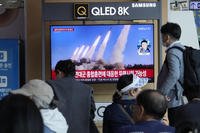Retired Brig. Gen. Donald D. Harvel is a former deputy commander of the Texas Air National Guard and a fellow at the American College of National Security Leaders.
Ten months, nine rounds and countless hours at the negotiating table later, U.S. and Taliban negotiators have finally reached an agreement in principle to wind down Washington's participation in the long Afghan war and accelerate political talks about Afghanistan's future.
According to U.S. Ambassador Zal Khalilzad, 5,400 U.S. troops will be withdrawn from five military bases within 135 days of the deal coming into force. Assuming the Taliban reduces violence as the deal outlines, Americans will begin to see their sons and daughters in uniform boarding planes and flying home.
Much of the agreement is still under lock and key, waiting for President Donald Trump's approval. There are a number of major questions to which we don't know the answers, perhaps the most significant being what the final timetable for a U.S. withdrawal looks like. Critics are already coming out of the woodwork to criticize the deal, and many view any U.S. troop departure from Afghanistan short of ideal conditions as an unwise capitulation. Yet what many of these same critics neglect to mention is that the words "ideal" and "Afghanistan" are about as oxymoronic as you can get. There is no victory or defeat in this war: only perpetual stalemate.
Washington's decision to begin a troop reduction was necessary in order to move peace discussions forward. It was also appropriate given the enormous sacrifice and investment the United States has devoted to this conflict over nearly 18 years.
The Taliban have been abundantly clear that U.S. troop withdrawals had to be a central part of any deal. The group was highly unlikely to proceed to political talks with other Afghans if Washington didn't at least establish a timetable for how and when a withdrawal would be implemented.
The 5,400 U.S. troop reduction is directly tied to the Taliban modifying its own behavior on the ground. The first stage of the agreement is structured in such a way that it tests both sides' willingness to fulfill their obligations. If the insurgents refuse to curtail violence, the deal could very well collapse before it has a chance to succeed.
As protracted as the U.S.-Taliban talks have been, negotiations between the Afghans themselves will be even more difficult. The arrangement between Washington and the Taliban was largely based on a quid pro quo: In return for U.S. troops pulling out, the insurgents would cut ties with al-Qaida, prevent terrorist groups from launching attacks against Americans, and participate in a discussion with fellow Afghans about how the country will be governed in the future. The incentive structure was also quite simple: If one side meets its commitments, the other side will do the same.
The intra-Afghan negotiations, however, will be an incredibly complex and muddled affair that could make the last 10 months of haggling between Washington and the Taliban look like a stroll on the beach.
Assuming the internally fragmented Afghan government is able to form an all-inclusive negotiating team, the talks will include debates on some of the most important and divisive issues any nation will ever consider. Afghanistan's very system of government will be an agenda item, with the Taliban delegation highly likely to push for constitutional amendments that other Afghans will find repugnant or unworkable.
Kabul will need to do its best to safeguard the progress made on women's and minority rights ever since the Taliban were ousted from power. The role of Islam in public life will be an explosive discussion. Even matters that may seem simple at first glance, like Afghanistan's formal name, have the potential to devolve into antagonistic exchanges at the negotiating table.
It's highly likely the intra-Afghan dialogue, if it ever occurs, could experience long and unwanted delays. And if U.S. officials are being forthright with themselves, they would soften their expectations and temper their enthusiasm.
All of these issues, from the balance-of-power in Kabul to the structure of Afghanistan's political system, can be resolved only by Afghans. While Washington can, and indeed should, express its own position on what is and is not acceptable, it will be the responsibility of Afghans to negotiate the future of their country.
With a deal in hand, the United States should spend the rest of its time planning a logically sequenced troop departure. Such an operation must be carried out cautiously. A rapid withdrawal will be a logistical nightmare. The Afghan national security forces will need time to prepare for a takeover of the bases U.S. troops choose to vacate.
A failure to plan meticulously will provide the Taliban with an opportunity to expand its presence in these areas and may even convince the group that reducing violence as called for in the deal is no longer needed to get American forces out. Any withdrawal must be impeccably timed in order to minimize the chances of the Taliban exploiting the situation or overturning the apple cart before Afghan negotiators sit down for a meeting.
No agreement concerning Afghanistan will be perfect. But neither is staying without an exit strategy. In fact, this would be the worst of all options.
-- The opinions expressed in this op-ed are those of the author and do not necessarily reflect the views of Military.com. If you would like to submit your own commentary, please send your article to opinions@military.com for consideration.













